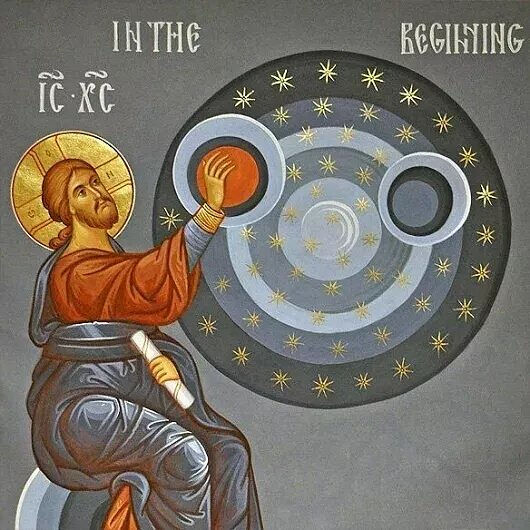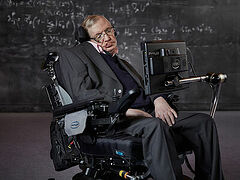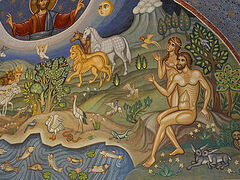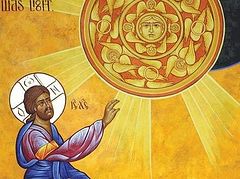With the help of revelation, we have traced, albeit weakly, the image of the Deity; we have seen that God exists and how He exists; we have seen the perfections of God, that there is something similar to our mind and will in Him; we have also seen that in Him there is both threeness and oneness; that He is God the Father, the Son, and the Holy Spirit, and that the whole of this Trinity takes care for the beatitude of men. Man is connected with this Tri-unity: This union is religion.
We must go through all of eternity to get to the Father, the Son, and the Holy Spirit. Consequently, all our wisdom must consist in knowing Them, all virtue—in striving for Them; finally, all blessedness—in union with Them. But besides man, there are other creatures; the whole world stands on the path that man must take to the Tri-Hypostatic God; it can’t but have an influence on man’s relation to God, and, conversely, God’s to man. There can be different views of the world, and these views can be wrong, but religion requires the one true view, because wrong views bring it harm. Therefore, we need to set about mapping the correct view of the world.
Note: What kind of religious view should we have? That the world is completely subordinate to God. This is in relation to God. In relation to man, the world should represent itself as the field of his activity. In relation to the world, man is lord—king. Consequently, in relation to the earth, he must be its ruler, its perfector; that’s why Adam was appointed to keep Paradise (Gen. 2:15). For inanimate creatures, he must be an interpreter; they proclaim the glory of God in silence, and he must clothe this proclamation in words.
Let us recall what concepts of the world were formed by the human mind in general, in whole nations, and in particular—in the philosophers. Some imagined the world as a random combination or coupling of atoms (Epicurus). This is the crudest concept, showing that those who were led by him had callous souls. Others argued that the world is co-eternal with God, and honored God only as the first perpetual mover (Aristotle). For others, the world was produced by God only in form, while recognizing it as eternal in matter (Plato). Finally, some presumed that the world emanated from God, or combined God and the world into one (pantheism). These are all the views the mind had and which can be found among philosophers to this day.
What does revelation do? In a few words, it obviates all these incorrect views: It completely subordinates the world to the will of God. For He spake, it says, and it was done; He commanded, and it stood fast (Ps. 32:9). A better expression in human language and a more satisfying moral purpose can’t be imagined. The teaching of the creation of the world is from Moses. Therefore, it was given more than 2,000 years before the Nativity of Christ, when other peoples had extremely crude teachings about the world. If the Jews alone had this teaching in such purity, then this one characteristic shows that it isn’t a product of the human mind.
In discussions about the world, the mind raises three questions: 1) where does the world come from—how did it come into existence? 2) What is the world—how does it exist? 3) What will happen to it—what’s its purpose? Revelation gives a direct and satisfactory answer to these questions.
The world received its beginning from God and was created out of nothing; that is, there were no materials for its creation; its foundation is in God; its cause is the will of God. Sacred Scripture speaks of this in many places: Creativity is attributed to God in the Old Testament as a special feature; that is, God is principally called the Creator in the Old Testament (Gen. 1:1).
Inasmuch as God is threefold, the question is: Did all Three Persons create the world, or just One? Scripture ascribes the creation of the world to all the Persons, but principally to the Second Person. For example, in the Gospel of John: All things were made by Him; and without Him was not any thing made that was made (Jn. 1:3); and in the Epistles of the Apostle Paul: By Whom also He made the worlds (Heb. 1:2); For by Him were all things created (Col. 1:16). There are no such passages about the Holy Spirit. Thus, the Son had a special part in the creation of the world—but what it was, we can’t say. Isn’t it because He has a special part that He Himself is the first fruit of Divine activity and that Sacred Scripture calls Him the firstborn of all creation? In us, everything is done through the internal and external word, and such activity should be an imprint of the Divine activity.
However, the creation of the world is attributed to the Holy Spirit as well, but not so clearly and directly. The book of Genesis says about Him: And the Spirit of God moved upon the face of the waters (Gen. 1:2). The time of His hovering, the object, and the action, show that it’s not a simple spirit, but the great, omnipotent Spirit. David says that everything is arranged and maintained by the Spirit of the Lord. By the Word of the LORD were the heavens made; and all the host of them by the Spirit of His mouth (Ps. 32:6). What difference can we see between the Persons regarding the creation of the world? The difference, according to St. Basil the Great, is the following: The Father is the preparatory cause of the world, which brought the essence of the world into being. The Son is the constructive cause, upon Whom depends the form and arrangement of the world. The Holy Spirit is the perfecting cause, Who directed everything to its end. So, the essence of the world and being depend upon the Father; laws and powers—on the Son; and the movement towards its end and life—on the Holy Spirit. This view is pious and akin to Scripture. For in many places, a decree is attributed to the Son, and the execution to the Holy Spirit, especially in the moral sense. Thus, the world was created by God the Father, through the Son, in the Holy Spirit.
What is the world made of according to Christian teaching? It’s made from nothing; that is, there was no material preceding its existence. The words “out of nothing,” which expresses this thought, is borrowed from the Vulgate. In the original (2 Mac. 7:28), this reads a little differently: It says here that the world was created not out of nothing, but from non-being. This “out of nothing” unsuccessfully expresses the idea that is meant to be conveyed. It’s not in Holy Scripture, but only that the will of God produced the world by His omnipotence.
But does Scripture in fact teach that there was no preceding matter? It does. For example, in the book of Genesis, Moses says: In the beginning God created the heaven and the earth (Gen. 1:1)—but from what, it doesn’t say. If some kind of material did exist, then this would be the most appropriate place to speak about it. But Moses was silent. Therefore, there was no such ready-made matter. This thought is stated more clearly elsewhere: Through faith we understand that the ages were framed by the word of God, so that things which are seen were not made of things which do appear (Heb. 11:3). The ages, meaning time and everything that is in time; the “unseen things” here doesn’t mean invisible matter: It’s the same as in the Second Book of Maccabees: “not existing” (2 Mac. 7:28). The Apostle Paul says elsewhere that God calleth those things which be not as though they were (Rom. 4:17). All these places give the idea that the world came into being without material. The same idea is in the testimony of Jesus Christ, when He, entreating glory from the Father, says: O Father, glorify Thou Me … with the glory which I had with Thee before the world was (Jn. 17:5). The Apostle Paul also teaches this when he says that God chose us before the foundation of the world (Eph. 1:4). Thus, Holy Scripture rejects the idea of the existence of matter and asserts that it is from the will of God alone.
But how could the world come from the will of God?
Before resolving this question, let’s ask: Where did this misunderstanding come from? From our will—from the fact that our will can’t create by desire alone. But God’s will isn’t our will—it differs from our will by this creativity. God “envisions” the world, and this envisioning is together with its realization. But if that’s so, then the world would have to have existed from eternity. It does exist this way, only we have to know how to understand this existence. That the will of God has such creative power is evident from the fact that even now this creativity is partially expressed in our will. The world is created, but man brings something of himself into it. For example, in the arts, man adds something to the already-formed matter; this something comes out of nothing, from our spiritual nature. These are: form, order, plan, and so on in building something. But there is also real creation in the will of man: those minutes when the will expresses its rational power, as happens in illnesses or ecstatic states, when a man’s thought acts not only on objects near him, but also on distant ones. So, there is a weak reflection of God’s creativity in the human will. The will, in fact, is the sole source of all changes in the world. For going beyond all laws, ascending from the lowest to the highest, you’ll finally reach a law or action, the beginning of which is hidden in the will alone; the first act of movement could flow only from a free conceptualization and aspiration.
How was the world made? How did it begin to exist? Revelation explicitly says that the method is a mystery. Through faith we understand (Heb. 11:3): The mind is incapable. How can we not marvel that philosophy spent so much time laboring over how to explain this method, and after so many centuries hasn’t realized that it’s impossible? But is it truly impossible? If it’s impossible for man to create something, then it’s also impossible to understand its means of existence, for the latter is equivalent to the former. The way the world exists is a mystery of God’s being. Sacred Scripture expresses this mystery in our tongue: For He spake, and it was done; He commanded, and it was created (Ps. 32:9). The idea here is that the world began to exist and exists by God’s will and omnipotence. We have no better expression. That’s why a pagan (Longinus) noticed that no one could express himself more appropriately than Moses in this case.
What was the world created for? What’s its purpose? What did God want to achieve, what did He want to express through His creation? What motive did He have for creating? Both Christian and non-Christian writers have many views on the world in this respect. Some considered the purpose of the world to be the glory of God: others—the blessedness of creatures; a third group took a more personal view—the perfection of moral beings. What is the true purpose of the world? Is it within, or outside of God? Apparently, it must be outside of God. For He is a self-fulfilled and all-perfect being. But for this very reason, He can’t propose anything outside of Himself, for otherwise He couldn’t be called such a being. So, it should be said that as God exists from Himself and for Himself, so the world exists from Him and for Him. And anyways, what could God propose outside Himself, when Holy Scripture clearly says that all creatures came about afterwards? The Apostle Paul presents us with one place, proving that the purpose of the world isn’t outside of God, but within God. In the Epistles to the Romans and Hebrews he says that everything is through Him … of Him, and to Him (Heb. 7:25, Rom. 11:36).
So, if the purpose of the existence of creatures is in God, then the question is: What in God serves as the purpose of the world? Need?—it can’t be; the completion of perfections?—again, impossible. The world is created because it’s in perfect dependence on God; it’s a gleam from the eternal sun—the shadow of the Godhead. And indeed, it’s known by reason and Scripture that the world is a reflection of God’s omnipotence and the greatness of His power: the holiness and wisdom in order and laws; love and goodness in enjoying the life of beings, and especially rational beings. This we know, but how many other Divine perfections He reveals and reflects in other ways unknown to us!... Thus, God’s “imperfections” proceed from the world, and the world is a natural consequence of God’s perfections.
But if so, then the world must exist from eternity. It does exist from eternity, as we’ll see, in the best sense of the word. Thus, the main goal of the world is God. Holy Scripture indicates other goals as well; for example, the moral perfection of beings: Created in Christ Jesus unto good works (Eph. 2:10), says the Apostle Paul in the Epistle to the Ephesians. Jesus Christ commanded: Be ye therefore perfect, even as your Father Which is in Heaven is perfect (Mt. 5:48). Another particular goal of many things according to Scripture is the beatitude of rational beings. For example, David says, or, better, repeats what is said in Genesis about man’s dominion on earth (Gen. 1:28): What is man, that Thou art mindful of him? … and didst set him over the works of Thy hands (Ps. 8:4, 143:3, Heb. 2:7). That means that part of the world exists, by the way, for man. Thus, the main goal must be distinguished. There are common goals for all rational beings—spirits and man, specific goals for man, and the most specific; for example, the purpose of the vegetable kingdom, the animal kingdom, and the purpose of even the tiniest insect. For, Sacred Scripture strongly instills us that the smallest thing in the world isn’t forgotten.
There are incorrect or one-sided views in this regard: 1) that everything is created for man—this is an egotistical view; 2) that everything was created for moral improvement; but there are things that are nothing more than lifeless instruments. This one-sidedness can also be seen in the writings of the Fathers. For example, Lactantius claimed that everything is for man, but St. Augustine and St. Basil the Great occupy the middle ground.1





